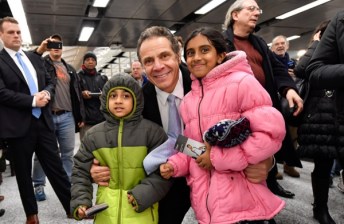Splinter Group of Senate Dems Want MTA Payroll Tax on Chopping Block

The fate of the payroll mobility tax, which brings in $1.34 billion a year to the MTA, just grew a little shakier. The four members of the State Senate’s new Independent Democratic Conference, who split off from the minority Democrats last week, have come out with their agenda and included in it is a call to “reform” the tax and even consider eliminating it. Any cut to the mobility tax would spell disaster for transit riders.
When the payroll tax originally passed in 2009, the vote was along strict party lines. Every Democrat voted for it and every Republican against. With the Republicans now in control of the Senate — led by the fiercely anti-payroll tax Dean Skelos — the mobility tax’s future in that chamber already seemed uncertain. But the possible support of the independent Dems could provide a repeal effort with bipartisan cover and some real momentum.
Here’s what the four members wrote in their platform:
MTA Tax Reform: Gross mismanagement is blamed for 1/3 of the MTA’s current fiscal debt. Our goal is to conduct a comprehensive forensic audit of the MTA to find areas of waste and corruption and determine the need and the efficacy of the current MTA tax.
It’s the phrase “determine the need” that’s most threatening, with its suggestion that there may be no need at all. Remember, the transit agency’s capital program — which covers expansions and badly-needed repairs — is a staggering $10 billion short and the agency just went through a painful round of service cuts, fare hikes and layoffs to make its operations budget add up. Even a deal that exempts the suburbs from the payroll tax but not the city would cause some combination of more service cuts, higher fares, and deferred maintenance.
One person who may be responsible for the conference’s anti-payroll tax stance is freshman senator David Carlucci, who represents Rockland County. Carlucci ran on a promise to repeal the payroll tax, which is extremely unpopular in the New York City suburbs. Explaining why he broke away, Carlucci named payroll tax repeal as a key disagreement between himself and the main Democratic conference.
Bronx Senator Jeff Klein, the conference’s unofficial leader, included the payroll tax in a list of what he considered the Democrat’s failures while in the majority. He and the other two incumbent senators in the conference, Diane Savino and David Valesky, voted for the payroll tax in 2009.
Any repeal of the payroll tax would also have to make it past the Assembly and the governor’s veto pen, so it’s at greater threat from a grand bargain than a direct assault. The bigger concern, therefore, is that the independent Dems are in some way affiliated with Governor Cuomo. During the campaign, Cuomo said that “we must revisit” the payroll tax.
